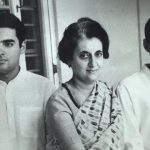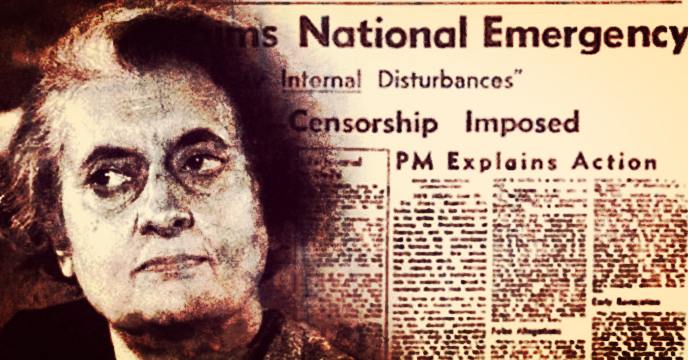June 25, 1975, a day that India can never afford to forget and it must not, at any cost.
Only 25 years after the people of this nation gave themselves an aspirational, beauteous and an outstandingly commendable democracy, it had been mercilessly trampled by the authoritarian feet, ironically by the daughter the first Indian Prime Minister Pt. Nehru, the member of the Constituent Assembly of the Country.
On this very day, the then Prime Minister of India Mrs. Indira Gandhi had declared Emergency that consequently witnessed the suspension of all civil liberties and the press censorship. The Indian democracy had been on death bed for 21 months but fortunately resuscitated after it. But, the gash that it received on its body and soul is still green in the people’ memory.
The famous Hindi Poet ‘Baba Naagarjun’ had then penned in his satirical tone:
“Indu ji, Indu ji, Kya Hua Aapko?
Satta Kee Masti mein, Bhul Gayi Baap ko?”
“Indu ji, Indu ji, what happened to you?
Did you forget your father in the inebriation of power?”
You may have certainly heard of several stories of excesses committed during this period and the brutal treatment extended to the dissenting voices, as the Internet is full of such accounts. Today, I shall tell you about that famous case that had an instrumental effect on the imposition of Emergency in the country. This famous case was, “State of Uttar Pradesh v. Raj Narain.” The judgment, in this case, was delivered by a very courageous judge, Justice Jagmohan Lal Sinha that had unseated the then Prime Minister Indira Gandhi, eventually led to the imposition of Emergency. The eminent Supreme Court lawyer Prashant Bhushan in his book, ‘The Case That Shook India’ says that ‘The rumblings set off by the judgment had their culmination in the midnight coup of June 26.’
Raj Narain was an acclaimed socialist leader. He had fought against Indira Gandhi in the Indian General Election of 1971 from Rae Bareilly constituency on the ticket of a grand alliance formed against Mrs. Indira Gandhi’s party. On 29th of December 1970, Mrs. Gandhi had held a Press Conference regarding elections where somebody told her that the opposition party leaders are claiming that you are changing your constituency from Rae Bareilly to Gurgaon, to which Mrs. Gandhi sternly responded in negative. On January 19, 1971, the opposition parties that had formed an alliance against Mrs. Gandhi’s Party decided to field Raj Narain to oppose Mrs. Indira Gandhi. To this, Mrs. Gandhi in her speech next day in Coimbatore castigated opposition for fielding Raj Narain against her by saying that he had been fielded against her because he is a known Nehru hater and baiter. Raj Narain was very much confident about his victory against Mrs. Gandhi, so much so that he had taken out victory procession before the actual results were announced.
But, the results were diametrically opposite to his expectation. Mrs. Gandhi trounced Raj Narain by a substantial margin of more than 1, 10,000 votes. Mrs. Gandhi had secured 1, 83,309 votes, whereas Raj Narain could manage to bag only 71,499 votes. This left him completely appalled. But, internally, he had not accepted the defeat. Meanwhile, murmuring began about the chemical treatment of ballot papers that he started believing because the results were astonishing for him. He decided to file an election petition in the High Court of Allahabad. Initially, Raj Narain went to Ramesh Chandra Srivastava, a lawyer known to him in Allahabad. Later on, he decided to engage senior counsel Shanti Bhushan in the matter, though he didn’t personally know him at that time. The initial draft prepared by some junior lawyers was presented to Shanti Bhushan that contained several allegations apart from the chemical treatment of ballot paper. Shanti Bhushan agreed to argue on his behalf but had certain preconditions. He said that he would argue the matter only if Raj Narain considers it as a serious petition and not a political stunt. He also said that the charge of the chemical treatment of ballot papers would have to be deleted, to which Raj Narain had to agree reluctantly. Shanti Bhushan added three more charges in this list. The exciting part was when Shanti Bhushan was asked about the chances of the success of the petition; his response was ‘Negligible.’ He said the first reason is that the case is not strong enough and secondly, few judges would have the courage to unseat the Prime Minister. But, what happened later is not a mystery but history.
The case witnessed extensive arguments from both the sides. Several justices got transferred in the meantime. Finally, the case came in the hand of Justice Jagmohan Lal Sinha who was considered to be a sincere and upright man. He expedited the hearings in the matter. Finally, on June 12, 1975, he delivered his judgment in favor of Raj Narain. He found Indira Gandhi guilty of electoral malpractices though he dismissed the charges of bribery against her. The election verdict in the Rae Bareilly had been declared null and void. On June 24, the Supreme Court granted a conditional stay of execution on this verdict, for which Indira Gandhi had managed to convince Nani. A. Palkhivala to appear for her. On June 25, Mrs. Gandhi imposed Emergency in the country.
However, it was not that easy for Justice Jag Mohan Lal Sinha to deliver this verdict. He had to go into seclusion to write this judgment. Mrs. Gandhi’s machinery often harassed him. She had even constituted a special task force of the CID to find out the content of the decision before it was pronounced. The Judge’s private secretary was also heavily harassed. Despite all this browbeating, this tremendously courageous judge didn’t succumb to the pressure. He upheld the ‘Rule of Law,’ which Mrs. Gandhi brutally crushed later.
Note: Certain facts mentioned in this article derive its source from Prashant Bhushan’s book, ‘The Case That Shook India’ published by ‘Penguin Books.’ The author is thankful to both for this.
Further, Read More:
Once upon a time in Gujarat: Police had assaulted Chief Judicial Magistrate!
When Benazir Bhutto mentioned Indian Army’s valour to censure Pakistani Army



